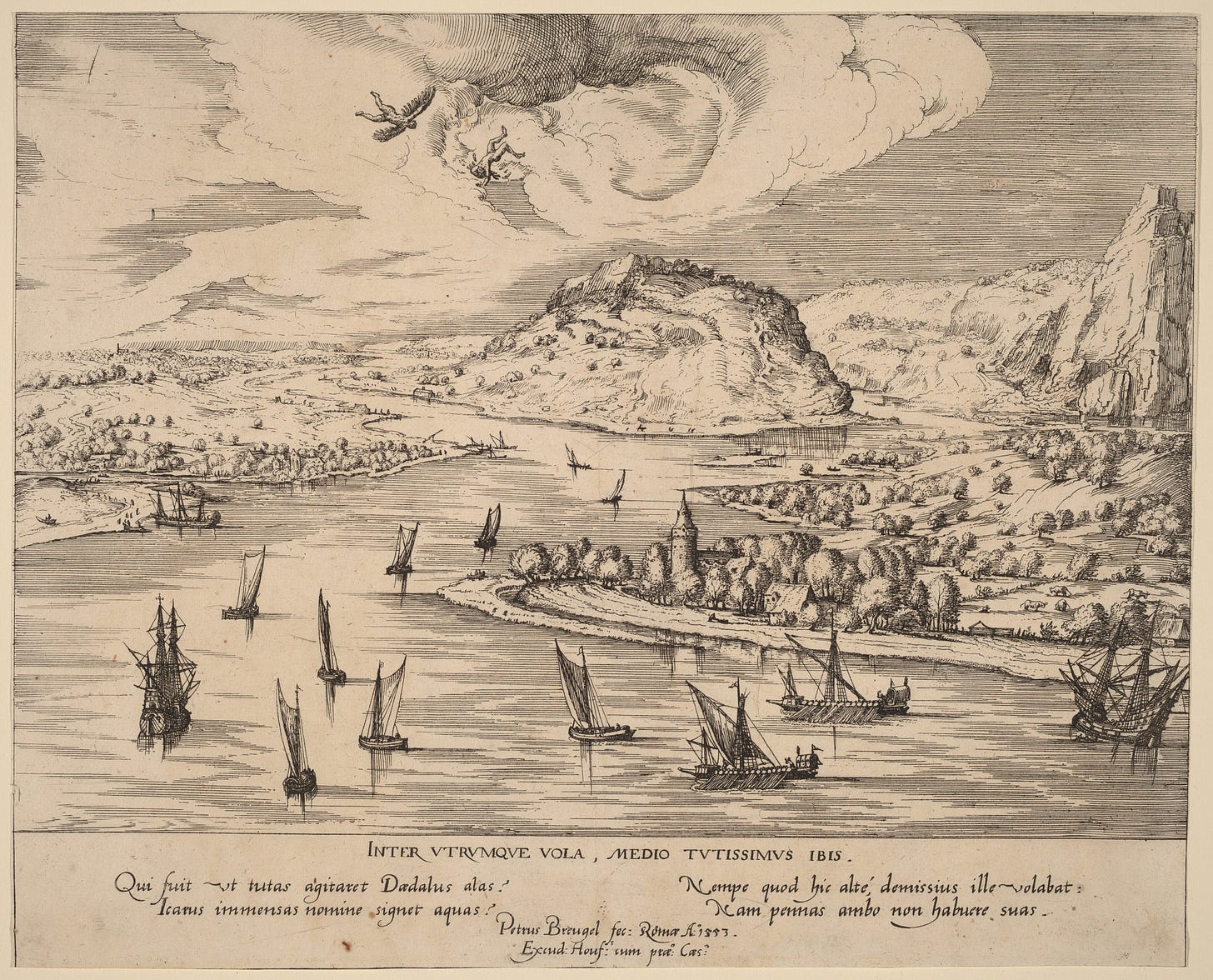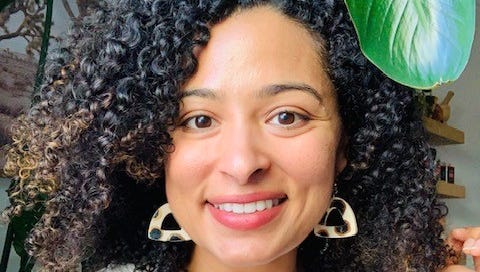Victoria Meléndez's Mythology Obsession
On the power of ancient stories and the omnipresence of myths in pop culture
It’s that time again. Time for an Obsessed Interview!
Allow me to introduce you to Victoria Meléndez, a writer and screenwriter living in Philadelphia, USA. Victoria is the author of the newsletter Finding the Words, where she writes essays on spirituality, pop culture, and figuring out how to live in this world.
I met Victoria in an online writer’s group during the pandemic. We hadn’t had the chance to connect in a while, so it was great to catch up. So great in fact, that I pressed the Record button 40 minutes into our chat. There was so much to talk about, like how Victoria stumbled across an old blues singer called Lucille Bogan, whose song “Shave ‘Em Dry” sounded like a 1930s version of “WAP” by Cardi B and Megan Thee Stallion.
And before I dive into the interview, dear reader, I must tell you that I listened to the song and COULDN’T BELIEVE MY EARS. Delightful! Thank you, Victoria, for sharing this important discovery. I am listening to Lucille Bogan as I write these words.
Okay. Here’s our conversation.
This interview has been edited and condensed for clarity and length.
Michelle Béland: Let’s talk about your obsession.
Victoria Meléndez: I have ADHD and the internet, therefore I am obsessed with all things. When I responded to you I was on this kick of reading Norse Mythology by Neil Gaiman and I’ve always been interested in mythology because I think there’s something about ancient stories that’s really powerful.
I love the idea of the stories people make up to explain their world. You know, someone was like “Why is the sky blue?” and then someone invented a god that liked that colour or whatever the deal is.
I noticed part of what I’ve found or what I continue to find so powerful about mythology is the weight that stories carry and how you can say so much just by referencing a myth.
In Hozier’s new album, Unreal Unearth, there’s a song called “I Carrion (Icarian)” and it’s a big play on words in a lot of ways. But a lot of it is Icarus imagery of the person that flew too close to the sun and it’s done in this really beautiful way. Typically this story is one about hubris; this person makes wings out of wax and flies so close to the sun that they melt and fall into the ocean.

(Hozier) starts off by saying something like “I feel so weightless, I’ve found that the meaning of life is not being burdened, these burdens are just the weight of the world.” And he says “If the ground finds its brutal way to me, I hope that you won’t fall away.” Everything that Hozier writes is poetry. That’s another conversation altogether. But he takes this story of hubris that we’re taught to perceive as “Oh! Look at that guy, he flew too close to the sun” or “Look at her, she girlbossed too close to the sun;” to take that story that carries that connotation and retell it from the lens of the person who did it, the person who chose to make the wings, was someone who wanted to be weightless and experience the world in a different way.
If you pay attention, mythology is everywhere. I watched the new Jordan Peele movie, Nope.
MB: The horror movie?
VM: Yes. So much ancient Greek imagery.
MB: Really?
VM: So much. For one, there’s an alien monster that is very much like Medusa in the way that it flows and moves, kind of snake-like. The people who look at it die. And even at the very beginning of the film, and *spoiler* to those who haven’t seen it, there’s a part where a character dies because a coin falls from the sky and through their eye socket.
In ancient Greece when someone died, you’d put coins on their eyes to pass them into the afterlife. So there are all of these little things, these little Easter eggs, that if you know mythology, then you know what’s going on here.
This is another sidebar, but as a kid we read poems in English class, and a lot of it was Irish poetry like Yeats, or Old English poetry like Shakespeare. And a lot of this is rich with biblical allusion. And because I’d read the whole Bible by the time I was sixteen, I could explain the layers. I find that when you know these myths, these stories from old, a word like Icarus carries so much weight. And when you put a word into a poem, the poem can be five stanzas long or even five lines long, it will carry a whole world within it because that one word is tied to so many stories.
MB: Would you say your fascination for mythology started when you were a kid?
VM: Yeah. A little kid because you learn about Greek mythology so early. That was part of the education system I was in. We learned about world religions, I think, in the fifth grade. And probably before that from movies. There’s always mythology in movies.
My mythology obsession started as far back as I can remember, and it’s continued in just seeing how these are portraits of humanity. In Greek mythology in particular, and maybe Norse too, is this idea of what people would be if they had so much power. And I think it’s a question we try to answer today in superhero movies, especially with supervillains. What would a corrupt person be like if they had unlimited power like Thanos? I think mythology has been a thought experiment of who we have the potential to be if we had it all.
The other thing that’s so interesting to me about mythology is that in a lot of ways, deity is meant to be the highest version of humanity and Greek gods are so flawed. Norse gods are so flawed. Arguably, Judeo-Christian gods are also flawed.

Seeing these stories (like The myth of Apollo and Daphne) about a young woman who is beautiful and is going to be raped and she calls out to the gods for help, and the response of the gods is to turn her into a tree to protect her? That is insane. But it gives you a lens into people’s values. And when we look at the state of women in the world, victim blaming goes as far back as “let’s just turn her into a tree” instead of taking issue with the bad guy.
In Christianity, what I grew up in, there’s so much of trying to use divinity as the standard. “Be like Jesus!” That’s not always real. That’s not how people live most of the time. Having such flawed people be gods in mythology is so much more real, so much more true. The deeper you go into these rabbit holes, the more you see the nuance in these characters. We’re taught that Icarus is silly and reckless when in actuality he’s curious and an explorer. We’re taught that Medusa is this evil monster, when in reality she’s a survivor of sexual violence. We’re taught all these things because the “gods” are supposed to be right.
I think often the way Christianity is taught is like “here is this book and you need to follow it” and people try to use that logic to look at other belief systems or other kinds of stories. That’s why you see Christians being against books with witchcraft in them. But the way you’re supposed to read these texts is like, this is a thing that happened, let’s ask questions about it. Let’s be curious. What are your thoughts? So you can look at these stories about Medusa and Icarus from the lens of you can do everything right and someone can still harm you. And sometimes the person in power is wrong and what do you do in a world where the people in power and the decision-makers are not on your side?
MB: Does mythology show up in your art?
VB: I definitely think my experience as a formerly religious person and currently spiritual person impacts my writing a lot. I think it does so more when I write poetry. I usually write creative nonfiction but I’ve noticed that when I write poetry, that’s when I’m more apt to bring in an allusion to something in mythology. I have a few short stories that I’ve written, like I have one that I’m working on now about Medusa but sort of the modernization of her story.
I've been digging into other mythologies lately too—mainly Taíno mythology as a means of digging into my Puerto Rican history and culture. There’s a whole world of mythologies and I believe learning more about them carries the possibility of enriching our art in new ways.
It was such a pleasure to learn more about mythology through Victoria’s lens—I’d forgotten how much of an influence it had not only on art but on beliefs and modern day pop culture. I took a Greek mythology class in university, but this was over 15 years ago and I have no recollection of anything because the class was on a Friday morning at 8 AM. So thank you so much for sharing your obsession, Victoria! I know more about the power of myths AND Lucille Bogan’s 1930s blues songs.
You can find Victoria Meléndez’s work here:
Newsletter: Finding the Words
Website: victoriamelendez.com
Instagram: @victoriamelendezwrites
Read an essay Victoria wrote for the midnight & indigo literary magazine, A Place for Everything, Everything in Its Place.
See you next week.




